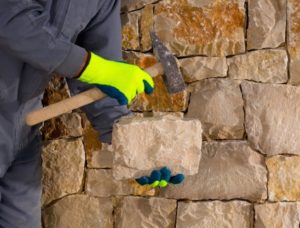I was sitting on the back porch at a guest house in Angel Fire, New Mexico, reading from my Daily Bible in Isaiah 51:1:
“Listen to me, you who pursue righteousness and who seek the Lord: Look to the rock from which you were cut and to the quarry from which you were hewn.”

It’s one of my favorite things about reading through the same version of The Daily Bible year after year: passages come at me at the same time of the year and at similar events in my life. Some passages that I might not notice otherwise take on special significance because of the particular day I read them.
I have these notes written in the margin of my Bible, each from a different era of my life:
* * * * *
I was cut from a quarry of Baptist preachers
I am a piece that was cut, that was hewn
* * * * *
As I get older, I want to be the rock itself, the quarry
* * * * *
Maybe I’d rather be the stonecutter.
* * * * *
For several years I’ve read the very same verses in Isaiah just prior to attending our family reunion.
I liked this notion of “the rock from which you were cut.” Isaiah went on to point out Abraham and Sarah, so we know he was referring to people—to ancestors, predecessors, parents and grandparents—when he wrote about “the rock.” He reminded those of us who seek the Lord to draw strength from our family.
Sitting in a room with 130-plus members of a family, it is fairly easy to pick out those who married in (like me) and those who are part of the family gene pool. No one can escape the power of genetics or the influence of their raising. I’m sure we’d all like to think we’re self-made and independent, but we can’t deny the “quarry from which we were hewn.” It’s written in our faces and our actions.
One thing about quarries: they are seldom homogeneous rock. There are always variations and fractures. Blocks of stone cut from the same quarry are never absolutely identical. They are all a little different.
And so it is with a family quarry. We are not a homogeneous band. We may be alike, but we are also different, with many variations and shades and fractures. We unwittingly pass along some variations or impurities we wish would remain hidden, and we propagate fractures we wish would heal.
At family reunions you often hear the phrase “He’s a chip off the old block” to describe how appearance and character are passed down. But I’ve never heard anyone use it about themselves, as in, “I’m a chip off the old block.” Maybe we like ourselves, and maybe we are proud of our lineage, but I doubt anyone wants to be a chip off of anything. We want to be ourselves, not someone else’s chip.
However, unlike a block of cut stone, we humans can be choosy about whom we emulate. We can take steps to avoid the fractures. We can be picky about whom we admire. We can choose which blocks to be a chip off of.
A few years ago, when I helped my grandmother write her autobiography and family history, I was reminded how many Baptist preachers, deacons, church officers, and women’s leaders are in my lineage. There is a rich vein of grace and strength that runs through my DNA, and I feel the blessing, even the obligation, that comes with that. It is my provenance, and I hope to live up to it. I want to be a quality rock, a source rock, a rich vein, a deep, long-lasting quarry.
I wrote this in my journal: “I have been blessed because of the faithfulness of my parents and grandparents and great-grandparents. I hope my children are blessed because of my faithfulness. Thank You, Lord, for the strength You have put into my life.”
* * * * *
“I run in the path of Your commands, for You have set my heart free.”
Psalm 119:32



 Tool Chest
Tool Chest
Leave a Reply